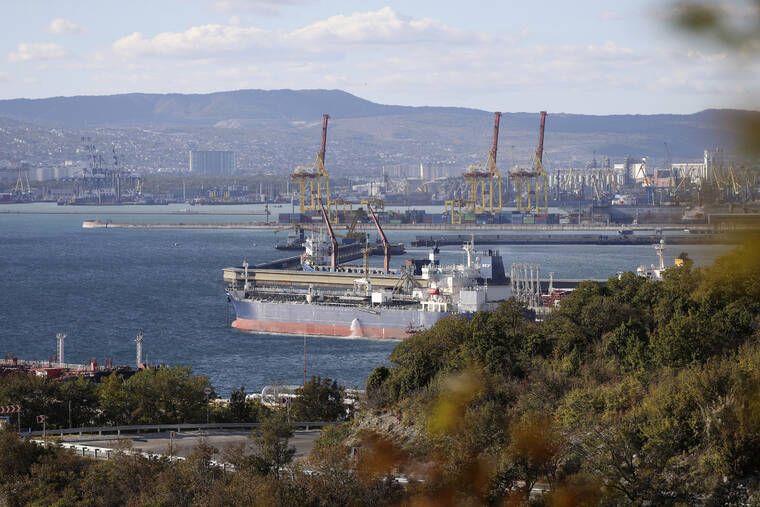E.U. edges closer to $60-per-barrel Russian oil price cap
BRUSSELS — The European Union was edging closer to setting a $60-per-barrel price cap on Russian oil — a highly anticipated and complex political and economic maneuver designed to keep Russia’s supplies flowing into global markets while clamping down on President Vladimir Putin’s ability to fund his war in Ukraine.
EU nations sought to push the cap across the finish line after Poland held out to get as low a figure as possible, diplomats said Thursday. “Still waiting for white smoke from Warsaw,” said an EU diplomat, who spoke on condition of anonymity because the talks were still ongoing.
The latest offer, confirmed by 3 EU diplomats, comes ahead of a deadline to set the price for discounted oil by Monday, when a European embargo on seaborne Russian crude and a ban on shipping insurance for those supplies take effect. The diplomats also spoke on condition of anonymity because the legal process was still not completed.
The $60 figure would mean a cap near the current price of Russia’s crude, which fell this week below $60 per barrel, and is meant to prevent a sudden loss of Russian oil to the world following the new Western sanctions. It is a big discount to international benchmark Brent, which traded at about $87 per barrel Thursday, but could be high enough for Moscow to keep selling even while rejecting the idea of a cap.
When the final number is in place, a new buyer’s cartel — which is expected to be made up of formal and informal members — will be born. Western allies in the Group of Seven industrial powers led the price cap effort and still need to approve the figure.
Oil is the Kremlin’s main pillar of financial revenue and has kept the Russian economy afloat so far despite export bans, sanctions and the freezing of central bank assets that began with the February invasion. Russia exports roughly 5 million barrels of oil per day.
The risks of the price cap’s failure are immense to the global oil supply. If it fails or Russia retaliates by stopping the export of oil, energy prices worldwide could skyrocket. Putin has said he would not sell oil under a price cap and would retaliate against nations that implement the measure.
U.S. and European consumers could feel the ramifications in more spikes to gasoline prices, and people in developing countries could face greater levels of food insecurity.
With the EU and U.K. banning insurance for Russian oil shipments, the price ceiling allows companies to keep insuring tankers headed for non-EU countries as long as the oil is priced at or under the cap. That would avoid a price spike from the loss of supplies from the world’s No. 2 oil producer and put a ceiling on Russia’s oil income near current levels.
The Treasury Department has released guidance meant to help firms and maritime insurers understand how to abide by the price ceiling, saying the price cap could fluctuate depending on market conditions.
Robin Brooks, chief economist at the Institute of International Finance in Washington, said the cap should have been implemented earlier this year, when oil was hovering around $120 per barrel.
“Since then, obviously oil prices have fallen and global recession is a real thing,” he said. “The reality is that it is unlikely to be binding given where oil prices are now.”
Critics of the price cap measure, including former Treasury Secretary Steve Mnuchin, have called the plan “ridiculous.”
Mnuchin told CNBC during a panel in November at the Milken Institute’s Middle East and Africa Summit that the price cap was “not only not feasible, I think it’s the most ridiculous idea I’ve ever heard.”
Rachel Ziemba, an adjunct senior fellow at the Center for a New American Security, said that while a worst-case scenario envisions Russia cutting off the global supply of its oil, “the Saudis and Emiratis would boost production.”
“Russia has made is clear the countries that abide by the cap won’t receive their oil and that could result in cuts to natural gas exports as well,” she said. “This will be an interesting few weeks and few months.”
———
Hussein reported from Washington. AP Business Writer David McHugh contributed from Frankfurt, Germany.

